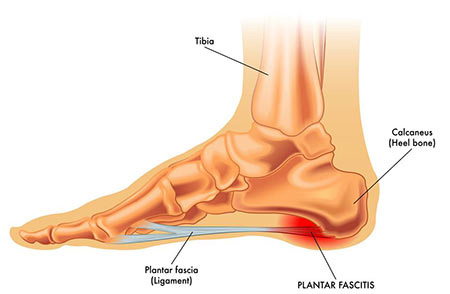 Midtown Manhattan
36 W 44th St Ste 1416 New York, NY 10036
Midtown Manhattan
36 W 44th St Ste 1416 New York, NY 10036
- (212) 621-7746
- text us
- BOOK ONLINE Call for Same Day Appointments
 Midtown Manhattan
36 W 44th St Ste 1416 New York, NY 10036
Midtown Manhattan
36 W 44th St Ste 1416 New York, NY 10036
Plantar fasciitis treatment is common among runners in Midtown Manhattan. Treatment for plantar fasciitis usually can be done at home, but requires you to take a break from your running schedule. If you don’t stop, plantar fasciitis treatments become more invasive, your pain can get worse and lead to treat plantar fasciitis risks that may sideline you for good. Come to our sports injury and pain management clinic to get your pain evaluation and treatment. Meet our pain doctor Febin Melepura M.D. to get the pain relief you need in the safe, reassuring hands of the best sports pain management specialists in NYC.
 The band of thick, fibrous tissue that connects your toes to your heel bones — running across the entire bottom of your foot — is called the plantar fascia. Plantar fasciitis occurs when that ligament becomes inflamed and causes you to seek plantar fasciitis treatment in Midtown Manhattan.
The band of thick, fibrous tissue that connects your toes to your heel bones — running across the entire bottom of your foot — is called the plantar fascia. Plantar fasciitis occurs when that ligament becomes inflamed and causes you to seek plantar fasciitis treatment in Midtown Manhattan.
Plantar fasciitis is one of the most common causes of foot pain, heel pain in particular. Most noticeably, the condition causes strong, stabbing pains in your foot when you first step out of bed in the morning. The pain usually subsides after a few hours and then worsens again as the day goes on and you spend more time on your feet.
In New York City, your sports medicine doctor and pain management specialist mostly see plantar fasciitis in runners. And once you get an inflamed plantar fascia, the discomfort becomes especially bothersome because it can take months before it heals. On top of that, it’s very difficult to find running shoes that help to alleviate the pain. In addition to running, other situations can lead to your desire for plantar fasciitis treatments. These include:
With plantar fasciitis, you don’t always feel the pain in your feet while you’re running or exercising. More often, it hurts when you stop. Just like when you first rise in the morning, you also may feel the pain worse when you get up after sitting for a while.
Additionally, without appropriate plantar fasciitis treatment, you may unknowingly adjust the way you stand, walk and move which can lead to back pain, herniated discs, or muscle spasms. That’s another reason to seek treatment early.
I called Dr. Meleprua in the evening desperately looking for a last-minute same-day appointment for my awful heel pain. Not only did the office verify my insurance information in record time, they had me in their office within an hour. THANK YOU SO MUCH. I received the utmost and most empathetic care I have ever received, and I left feeling like a new person. HIGHLY RECOMMEND.
Jonathan VFor the most part, your treatment plantar fasciitis options mostly rely on home care and non-invasive techniques such as:
Once you’ve seen your Manhattan sports doctor and received a firm plantar fasciitis diagnosis, you can take steps so that you can keep running while you undergo plantar fasciitis treatment. With your doctor’s supervision, you may try:
Your sports medicine doctor may suggest more invasive treatment for plantar fasciitis if you don’t get any relief from home remedies. The next level of plantar fasciitis treatment includes:
Do you have any questions about the plantar fasciitis treatment we offer in NYC? Would you like to schedule an appointment with the best-rated foot pain management doctor Febin Melepura MD of sports pain management NYC clinic? Please contact our office for a consultation with the pain relief specialist in Midtown Manhattan.

Febin Melepura, MD is a top rated, best in class interventional pain management doctor. He is a nationally recognized pain relief specialist and is among the top pain care doctors in New York City and the country. He is an award winning expert and contributor to a prominent media outlets.
Dr. Febin Melepura has been recognized for his thoughtful, thorough, modern approach to treating chronic pain and, among other accolades, has been named a “top pain management doctor in New York”, and one of “America’s Top Doctors™” for an advanced sports injury treatments.